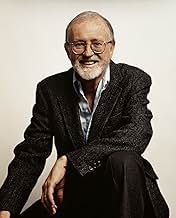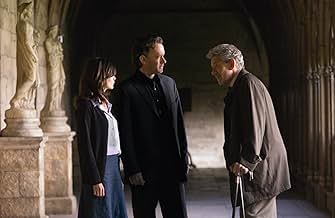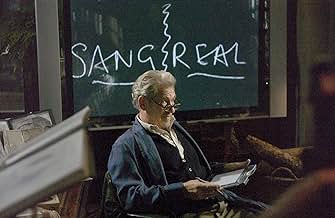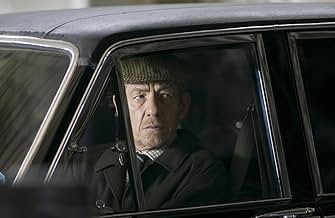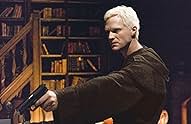Un assassinio all'interno del museo del Louvre ed indizi nascosti nei soui dipinto conducono alla scoperta di un mistero celato da una società segreta religiosa da più di duemila anni.Un assassinio all'interno del museo del Louvre ed indizi nascosti nei soui dipinto conducono alla scoperta di un mistero celato da una società segreta religiosa da più di duemila anni.Un assassinio all'interno del museo del Louvre ed indizi nascosti nei soui dipinto conducono alla scoperta di un mistero celato da una società segreta religiosa da più di duemila anni.
- Regia
- Sceneggiatura
- Star
- Premi
- 8 vittorie e 21 candidature totali
Andy Clark
- Docent
- (as Andrew Clark)
Recensioni in evidenza
So I suggest not writing this off as a Hollywood hack film, simply because it's the bandwagon thing to do. Before you go and see The Da Vinci Code, let all the negative and positive hype surrounding this production cancel each other out, clear your mind, and judge this film fairly. Do NOT judge it on its usually weak director, do NOT judge it entirely on the source material and do NOT judge it on your religious beliefs. All this will be rewarding.
I have not read the book so I will not attempt any kind of comparison.
Plot essentially goes like this: In the middle of the night, Professor Robert Langdon (Tom Hanks) is summoned as an expert to a crime scene in Le Louvre where a terrible murder has been committed. The victim's body is self-placed in such a bizarre, symbolic way next to one of the world's most famous paintings that the investigation gradually unlocks age-old mysteries that many do not wish to be unlocked.
The Da Vinci Code is a chilling, thrilling and well-sewn together mystery thriller that often keeps you on the edge of your seat. The cast do not disappoint either. Paul Bettany is genuinely creepy as Silas and thereby reinforces the stereotype that all albinos are evil. While Audrey Tatou is annoyingly frail as Sophie Neveu, she is captivating and lovely and is able to project both charisma and presence on screen in this film. However, Tom Hanks did not at all feel like the protagonist in the story and I am unaware whether that was intentional or not but I'm guessing no, in which case Hanks definitely fails in both attracting and keeping our interest.
So the cast usually perform well (with the exception of Hanks) and the story is also facilitated by some very striking visuals. A big plus for this film which elevates it slightly above generic formula is its beautiful locations often seen through epic aerial shots. Good call, Howard! Another big plus is its distinctly Euro-centric feel in both style and substance. This surprised me since it is Tom Hanks and Ron Howard in the same film, but they do manage to keep the overblown Hollywood clichés to a minimum. This is even apparent in the score by Hans Zimmer; it is not overblown, but subtle and appropriate in the scenes to which it was scored. Similarly, Frenchmen do not speak English with a French accent when they were alone together, but speak in French. That said, the plot does unfold in a somewhat Hollywood fashion -- and the plot happens to be thinner than an Olsen twin.
To counter the good parts, two big minuses in The Da Vinci Code are its wooden and sometimes even placeholder dialogue and its distinct lack of humor. I felt the actors were much too serious for this kind of film, which is first and foremost an adventure story, fast-paced and constantly unlocking new mysteries. The issues in the film were serious enough and needed more comedy to balance them.
As I write this review, more and more bad points about it spring to mind. This is strange, since I remember sitting in the cinema with my friends just a few hours ago and being thoroughly entertained and captivated by the whole thing. So, never mind the occasionally insultingly far-fetched plot and plot-twists by Dan Brown; The Da Vinci Code is a nicely done and very entertaining film in which nothing feels missing or incomplete.
7/10
I have not read the book so I will not attempt any kind of comparison.
Plot essentially goes like this: In the middle of the night, Professor Robert Langdon (Tom Hanks) is summoned as an expert to a crime scene in Le Louvre where a terrible murder has been committed. The victim's body is self-placed in such a bizarre, symbolic way next to one of the world's most famous paintings that the investigation gradually unlocks age-old mysteries that many do not wish to be unlocked.
The Da Vinci Code is a chilling, thrilling and well-sewn together mystery thriller that often keeps you on the edge of your seat. The cast do not disappoint either. Paul Bettany is genuinely creepy as Silas and thereby reinforces the stereotype that all albinos are evil. While Audrey Tatou is annoyingly frail as Sophie Neveu, she is captivating and lovely and is able to project both charisma and presence on screen in this film. However, Tom Hanks did not at all feel like the protagonist in the story and I am unaware whether that was intentional or not but I'm guessing no, in which case Hanks definitely fails in both attracting and keeping our interest.
So the cast usually perform well (with the exception of Hanks) and the story is also facilitated by some very striking visuals. A big plus for this film which elevates it slightly above generic formula is its beautiful locations often seen through epic aerial shots. Good call, Howard! Another big plus is its distinctly Euro-centric feel in both style and substance. This surprised me since it is Tom Hanks and Ron Howard in the same film, but they do manage to keep the overblown Hollywood clichés to a minimum. This is even apparent in the score by Hans Zimmer; it is not overblown, but subtle and appropriate in the scenes to which it was scored. Similarly, Frenchmen do not speak English with a French accent when they were alone together, but speak in French. That said, the plot does unfold in a somewhat Hollywood fashion -- and the plot happens to be thinner than an Olsen twin.
To counter the good parts, two big minuses in The Da Vinci Code are its wooden and sometimes even placeholder dialogue and its distinct lack of humor. I felt the actors were much too serious for this kind of film, which is first and foremost an adventure story, fast-paced and constantly unlocking new mysteries. The issues in the film were serious enough and needed more comedy to balance them.
As I write this review, more and more bad points about it spring to mind. This is strange, since I remember sitting in the cinema with my friends just a few hours ago and being thoroughly entertained and captivated by the whole thing. So, never mind the occasionally insultingly far-fetched plot and plot-twists by Dan Brown; The Da Vinci Code is a nicely done and very entertaining film in which nothing feels missing or incomplete.
7/10
I've read the book, and the movie's not so bad. Obviously there are many things I'd do different, but in the end it's 2,5 hours of good entertainment, and isn't that what the ratings are all about? Personally I think Tom Hanks wasn't passionate enough for Robert Langdon. That's why it's not a 9 for me.
A lot of people are too harsh on this one. Mostly because they know the book and have very high expectations. I have to see my first book-to-film where the film is better.
Also, you're not going to hell for watching this movie or reading the book. It's based on a novel, which is based on a few loose theories, but in the end all it wants to do is to entertain. And that is exactly what both the book and the movie did for me.
A lot of people are too harsh on this one. Mostly because they know the book and have very high expectations. I have to see my first book-to-film where the film is better.
Also, you're not going to hell for watching this movie or reading the book. It's based on a novel, which is based on a few loose theories, but in the end all it wants to do is to entertain. And that is exactly what both the book and the movie did for me.
Last Tuesday, when The Da Vinci Code premiered at the Cannes Film festival, it was met with a chilly reception from the reviewing elite. It has been called "plodding," "stale," and "uninspired," thus, dashing the hopes of many movie goers who were hoping to see one of their favorite novels brought to life by one of their favorite directors, and starring one of their favorite actors. Since I'm not a slave to snobby film reviewers, I went to go see it for myself despite the negative hype. And as the credits rolled at the end of the movie, I felt increasingly unsettled; not because of the quality of the movie, but because one question lingered in my head: What's not to like? Am I crazy for actually being entertained by what I just saw? How could the critics pan what I, and those around me, seemed to enjoy? Okay, so that's more than one question....
First, I have to qualify myself. I read the book and I LOVED it; couldn't put it down. I loved the history, the speculation, the riddles and puzzles, and the masterful blend of fact and fiction. Additionally, I'm not religious, although I was definitely familiar with Christian historical icons such as Jesus, John the Baptist, and Mary Magdelene before I read the book. I also happen to be a big fan of Tom Hanks, Ron Howard, and Ian McKellan.
Having said that, I went in prepared to like this movie, even though I had somewhat lowered my expectations based on the barrage of bad reviews. All of this proved to be a winning formula for me, apparently.
If you're like me and you loved the book and you like the artistic team that pursued making it into a movie, then you'll most likely come out satisfied. You won't mind what many critics have called "overly-long exposition" and historical flashbacks, because that's pretty much what the book consisted of. And in the book, it was absolutely engrossing! So, I personally didn't mind all of the explanation of history, symbols, etc.
Critics have also found fault with Tom Hanks and Audrey Tatou's portrayals of Robert Langdon and Sophie Neveu (respectively), saying that they delivered flat performances. But once again, whoever read the book will remember that both of these characters weren't that dynamic on the written page, either. Of course, Sir Ian McKellan, with the juiciest role of Holy Grail scholar Sir Leigh Teabing, chews up the scenery every time he's shown on screen. Sir Leigh Teabing was also one of the richest characters in the book.
I think that the people who won't like this movie are people who didn't read the book, and are going into the theater expecting a regular movie, which it's not. It's an adaptation of a very wordy, detailed, twisting, speculative novel that blends fact and fiction in a devastatingly effective way, and it's easy to get lost while watching the movie if you don't already know where the story is going. Sure, Ron Howard uses digitized, grainy flashbacks of ancient pagan rituals and societies to move the narrative along and to keep the audience on point, but I can see how it could be overwhelming to those who only know the bare bones of the plot. However, those who found it fascinating in the book will find pleasure in seeing the visual accompaniment to what they've already read.
In short, you go see this movie (or read the book) for how it challenges popularly-held beliefs; not for its rich, engaging character development. It's a quest for the "truth", and in terms of the IDEAS expressed, they did a dag-blasted good job of translating those ideas onto the screen. Those who often complain that movies don't stay true to the books that they're based on will find comfort in the fact that Akiva Goldsman and Ron Howard have stayed incredibly close to the original text when translating it onto the screen. However, this will be to the dismay of those movie-goers who haven't read the book, and are therefore expecting a traditional action thriller with traditional action thriller dialogue.
If you go to RottenTomatoes.com, you'll see the huge disparity between what the critics have said, and what the users have said regarding this film. While the cumulative critics rating is a dismal 22%, the combined user rating is a 74%, which is way above average for the site. That should speak volumes to whoever is skeptical about seeing the movie because of the bad reviews.
The bottom line is that it's definitely a movie worth watching if only to see how the creative team behind it went about turning the best-selling novel into celluloid. It's also a treat to see something in popular culture challenge popular religious ideals so skillfully, even if only in the form of fiction.
My advice: go see for yourself.
First, I have to qualify myself. I read the book and I LOVED it; couldn't put it down. I loved the history, the speculation, the riddles and puzzles, and the masterful blend of fact and fiction. Additionally, I'm not religious, although I was definitely familiar with Christian historical icons such as Jesus, John the Baptist, and Mary Magdelene before I read the book. I also happen to be a big fan of Tom Hanks, Ron Howard, and Ian McKellan.
Having said that, I went in prepared to like this movie, even though I had somewhat lowered my expectations based on the barrage of bad reviews. All of this proved to be a winning formula for me, apparently.
If you're like me and you loved the book and you like the artistic team that pursued making it into a movie, then you'll most likely come out satisfied. You won't mind what many critics have called "overly-long exposition" and historical flashbacks, because that's pretty much what the book consisted of. And in the book, it was absolutely engrossing! So, I personally didn't mind all of the explanation of history, symbols, etc.
Critics have also found fault with Tom Hanks and Audrey Tatou's portrayals of Robert Langdon and Sophie Neveu (respectively), saying that they delivered flat performances. But once again, whoever read the book will remember that both of these characters weren't that dynamic on the written page, either. Of course, Sir Ian McKellan, with the juiciest role of Holy Grail scholar Sir Leigh Teabing, chews up the scenery every time he's shown on screen. Sir Leigh Teabing was also one of the richest characters in the book.
I think that the people who won't like this movie are people who didn't read the book, and are going into the theater expecting a regular movie, which it's not. It's an adaptation of a very wordy, detailed, twisting, speculative novel that blends fact and fiction in a devastatingly effective way, and it's easy to get lost while watching the movie if you don't already know where the story is going. Sure, Ron Howard uses digitized, grainy flashbacks of ancient pagan rituals and societies to move the narrative along and to keep the audience on point, but I can see how it could be overwhelming to those who only know the bare bones of the plot. However, those who found it fascinating in the book will find pleasure in seeing the visual accompaniment to what they've already read.
In short, you go see this movie (or read the book) for how it challenges popularly-held beliefs; not for its rich, engaging character development. It's a quest for the "truth", and in terms of the IDEAS expressed, they did a dag-blasted good job of translating those ideas onto the screen. Those who often complain that movies don't stay true to the books that they're based on will find comfort in the fact that Akiva Goldsman and Ron Howard have stayed incredibly close to the original text when translating it onto the screen. However, this will be to the dismay of those movie-goers who haven't read the book, and are therefore expecting a traditional action thriller with traditional action thriller dialogue.
If you go to RottenTomatoes.com, you'll see the huge disparity between what the critics have said, and what the users have said regarding this film. While the cumulative critics rating is a dismal 22%, the combined user rating is a 74%, which is way above average for the site. That should speak volumes to whoever is skeptical about seeing the movie because of the bad reviews.
The bottom line is that it's definitely a movie worth watching if only to see how the creative team behind it went about turning the best-selling novel into celluloid. It's also a treat to see something in popular culture challenge popular religious ideals so skillfully, even if only in the form of fiction.
My advice: go see for yourself.
6GF9
I can't say I was blown away by The Da Vinci Code - as is often the case, the book was far superior. I generally like Tom Hanks in almost all his roles, however I found that I had such a pre-conception of what Robert Langdon should be, that it took me about half an hour to get used to Hanks occupying this character. Once I settled into it though - it was a thoroughly enjoyable, occasionally slow moving thriller. Having read the book, I did have a knowledge of the various groups and factions involved - I'm not sure how someone who hasn't read the book will fair though. The casting of the movie is surely one of it's stronger points - Paul Bettany is almost unrecognisable and plays the menacing single minded Silas to utter perfection. Sir Ian McKellan too, it totally fantastic, and really steals most scene's he appears in. He delivers some great one liners too - a real character actor playing a real character. Audrey Tautou is as we have come to expect, just lovely, and who else could have played Bezu Fache - Jean Reno was made for the role. As you'd expect from a Ron Howard Production, there is a good amount of cheese, especially towards the end. Langdon's "Godspeed" caused me to awake in the night sweating! I am a fairly harsh marker on the IMDb, so don't be put off by a 6 out of 10 - I did enjoy the movie, but my anticipation was so great with this film, that it could never live up to my expectation.
If you take the most popular book in recent years, you should have the most popular movie since The Lord of the Rings, right? Wrong. Though the film was hotly debated, its cinematic quality and popularity aren't nearly as high as one would expect. Amid protests, pending lawsuits, and outright denouncements by Catholic officials, Ron Howard released his adaptation of Dan Brown's novel, The Da Vinci Code.
American symbologist Robert Langdon (Tom Hanks) and French cryptologist Sophie Neveu (Audrey Tautou) are on a trans-European quest to solve riddles left by Louvre curator, Langdon's hero and Neveu's grandfather, Jacques Saunier, as he lay dying. The riddles and subsequent quest allegedly lead to the true identity and whereabouts of the famed Holy Grail. Hot in pursuit of the thinking man's Bonnie and Clyde is Javert-ian French police captain Bezu Feche (Jean Reno), intent on pinning the murder of Suanier on Langdon and Neveu, and albino monk, Silas (Paul Bettany) under the command of a mysterious telephone voice known only as The Teacher.
With a pedigree such as the most popular book in the world, two Academy Award winners (Hanks, Howard and writer Akiva Goldsman), French film superstars (Tautou and Reno) and Gandalf (Ian McKellen), you'd wonder how such a film could fail.
Well, how about the miscast of Howard as director. Howard lacks the vision to properly adapt the novel and bring it to life. Some of the blame does go to his Cinderella Man scribe Akiva Goldsman for not writing a fitting script. But Howard's awkwardness is more prominent. If we were going to pick name directors for this film, Steven Spielberg would have been better choice, but I think David Fincher (Se7en and Fight Club) would have been perfect.
The whole production felt rushed. Having just read the book, a lot of plot points were fresh in my mind, and that may have clouded the comprehension of certain things, which I think Howard and Goldsman were counting on. Looking back on it, the first 30-45 minutes were very rushed, and I don't think things were adequately explained. They were still referenced and used in the movie, but not explained well. It suffered from the, what I call, Godfather syndrome: referencing things from the book at the wrong time. They could have taken their time with the film, and it would have told the same story, and been a lot better.
Hanks was out of place as Landon, our hero. He doesn't have or project the same presence about him that Langdon should have. Might I suggest seasoned conspiracy theory veteran David Duchovny? As with Mission:Impossible:III, the supporting cast was impeccably put together, and the one true weakness of the cast is unfortunately the keystone (maybe it's just a bad year for actors named Tom).
Slightly better than your average summer fair, but still doesn't hold up when put against the equally action oriented yet wholly more insightful X-Men franchise.
American symbologist Robert Langdon (Tom Hanks) and French cryptologist Sophie Neveu (Audrey Tautou) are on a trans-European quest to solve riddles left by Louvre curator, Langdon's hero and Neveu's grandfather, Jacques Saunier, as he lay dying. The riddles and subsequent quest allegedly lead to the true identity and whereabouts of the famed Holy Grail. Hot in pursuit of the thinking man's Bonnie and Clyde is Javert-ian French police captain Bezu Feche (Jean Reno), intent on pinning the murder of Suanier on Langdon and Neveu, and albino monk, Silas (Paul Bettany) under the command of a mysterious telephone voice known only as The Teacher.
With a pedigree such as the most popular book in the world, two Academy Award winners (Hanks, Howard and writer Akiva Goldsman), French film superstars (Tautou and Reno) and Gandalf (Ian McKellen), you'd wonder how such a film could fail.
Well, how about the miscast of Howard as director. Howard lacks the vision to properly adapt the novel and bring it to life. Some of the blame does go to his Cinderella Man scribe Akiva Goldsman for not writing a fitting script. But Howard's awkwardness is more prominent. If we were going to pick name directors for this film, Steven Spielberg would have been better choice, but I think David Fincher (Se7en and Fight Club) would have been perfect.
The whole production felt rushed. Having just read the book, a lot of plot points were fresh in my mind, and that may have clouded the comprehension of certain things, which I think Howard and Goldsman were counting on. Looking back on it, the first 30-45 minutes were very rushed, and I don't think things were adequately explained. They were still referenced and used in the movie, but not explained well. It suffered from the, what I call, Godfather syndrome: referencing things from the book at the wrong time. They could have taken their time with the film, and it would have told the same story, and been a lot better.
Hanks was out of place as Landon, our hero. He doesn't have or project the same presence about him that Langdon should have. Might I suggest seasoned conspiracy theory veteran David Duchovny? As with Mission:Impossible:III, the supporting cast was impeccably put together, and the one true weakness of the cast is unfortunately the keystone (maybe it's just a bad year for actors named Tom).
Slightly better than your average summer fair, but still doesn't hold up when put against the equally action oriented yet wholly more insightful X-Men franchise.
Lo sapevi?
- QuizAudrey Tautou revealed that, during her audition, she asked if she could take a photo of Ron Howard and Tom Hanks to prove that she'd actually met them.
- BlooperThere was no need to know the capsule's combination in order to open it as vinegar is easily frozen in a household freezer. Simply freeze the capsule and then smash it open to reveal the internal message.
- Citazioni
Robert Langdon: You say you hate history. Nobody hates history. They hate their own histories.
Sophie Neveu: So now you're a psychologist too?
- Curiosità sui creditiThe "A" and "V" in the film title are replaced with the "Blade" and the "Chalice" symbols described by Langdon in the movie.
- Versioni alternativeThe film was originally shown to the UK censors in an unfinished form, with a temp score and sound mix. The BBFC advised Sony Pictures that sound levels during some acts of violence may be too impactful for the requested "12A" rating, so the film was likely to receive a 15 classification. When formally submitted, the final levels of sound effects on the completed soundtrack had reduced the strength of some acts of violence to an extent which made the film able to get a "12A" rating.
- ConnessioniFeatured in The Amazing Race: Herculean Effort for Some Herculean Dudes (2006)
I più visti
Accedi per valutare e creare un elenco di titoli salvati per ottenere consigli personalizzati
- How long is The Da Vinci Code?Powered by Alexa
- What is 'The Da Vinci Code' about?
- Is "The Da Vinci Code" based on a book?
- Is "The Da Vinci Code" based on a true story?
Dettagli
- Data di uscita
- Paesi di origine
- Siti ufficiali
- Lingue
- Celebre anche come
- El código Da Vinci
- Luoghi delle riprese
- Aziende produttrici
- Vedi altri crediti dell’azienda su IMDbPro
Botteghino
- Budget
- 125.000.000 USD (previsto)
- Lordo Stati Uniti e Canada
- 217.536.138 USD
- Fine settimana di apertura Stati Uniti e Canada
- 77.073.388 USD
- 21 mag 2006
- Lordo in tutto il mondo
- 760.200.455 USD
- Tempo di esecuzione2 ore 29 minuti
- Colore
- Mix di suoni
- Proporzioni
- 2.39 : 1
Contribuisci a questa pagina
Suggerisci una modifica o aggiungi i contenuti mancanti







